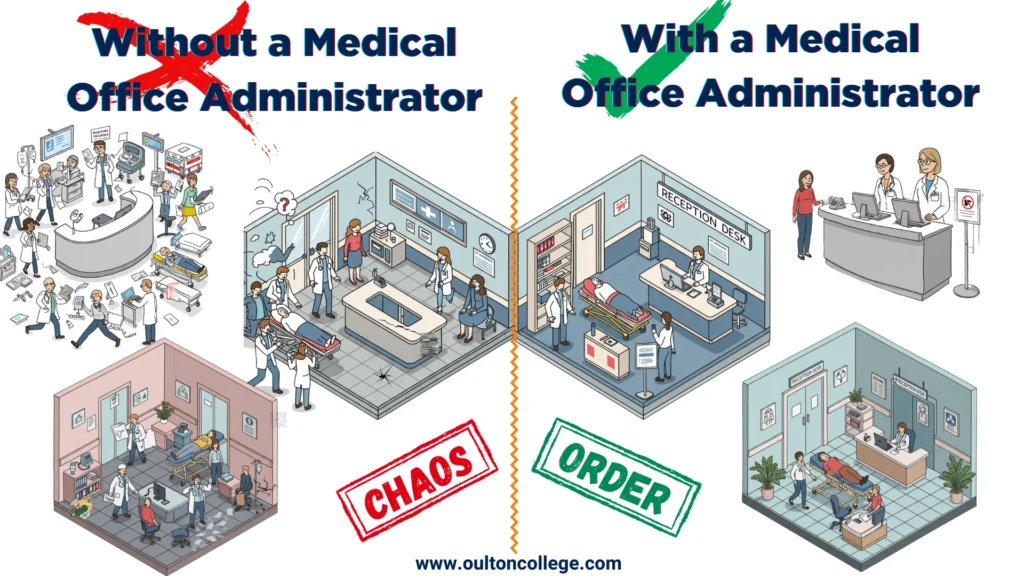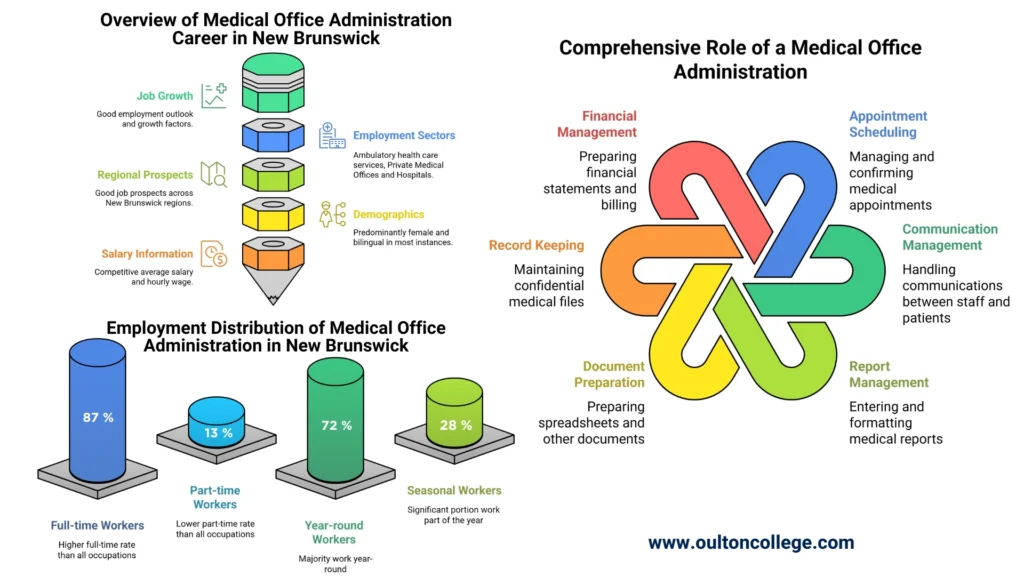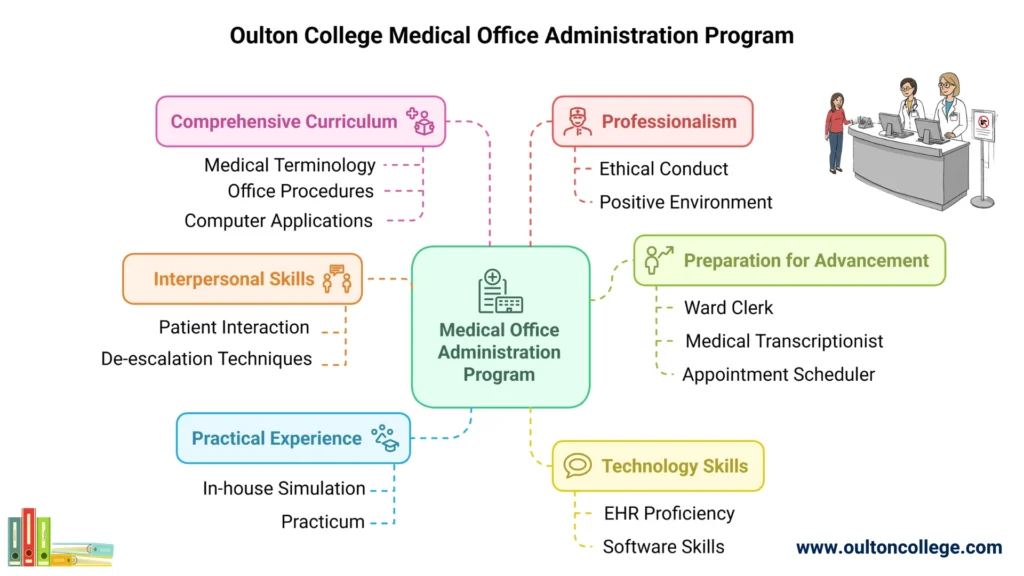Code Chaos
The Real Reason Medical Dramas Are So Stressful

Ever watched a medical drama like Grey’s Anatomy, ER, or House and felt your own heart rate spike with the characters as they navigate frantic emergencies, shouting over each other, and rushing down hallways? It’s all very gripping television, but it begs the question: “Why are these shows always so dramatically chaotic?” Could it be more than just good TV? The answer might lie in the conspicuous absence of a key player in any real healthcare setting: the Medical Office Administrator (MOA). Where are the calm, organized professionals who quietly keep things running smoothly? In most medical dramas, they’re nowhere to be seen, and the chaos ensues.
The Missing Piece
Medical Office Administration (MOA) Vacuum
Medical dramas like Grey’s Anatomy and Chicago Med often focus on the high-stakes, dramatic moments of patient care, completely overlooking the crucial administrative role of the Medical Office Administrator (MOA) that supports these efforts. This creates a ‘MOA vacuum,’ where essential tasks such as patient management, scheduling, communication, and medical record-keeping are either ignored or portrayed as if they magically happen. In reality, these tasks are expertly managed by MOAs, and without their meticulous attention to detail, the system would quickly devolve into the kind of chaotic mess often depicted on screen.Real-World Contrast
The Calm Efficiency of a Well-Run Office
Now, imagine a real medical office or clinic—one where skilled Medical Office Administrators are at the helm. Instead of frantic shouting and lost paperwork, you’d find a calm, efficient environment. Organized medical schedules ensure patients are seen on time, minimizing wait times and stress. Patient records are meticulously maintained, whether in physical or electronic formats, readily available when needed. Smooth patient flow is facilitated by clear communication and coordinated referrals. All this is possible due to the work of the Medical Office Administrator , who manages the details.
Think of it this way: Imagine a world where the doctor isn’t constantly searching for lost files, because the Medical Office Administration Assistant has everything perfectly organized. Imagine a clinic where appointments aren’t double-booked, because the Medical Office Administration Assistant has skillfully coordinated schedules. In the real world, these things are taken care of by Medical Office Administrators. They ensure that healthcare providers can focus on what they do best – patient care – instead of being bogged down by administrative burdens.
Unsung Heroes Behind the Scenes
Medical Office Administrators in New Brunswick

Why Become a Medical Office Administrator?
A career as an Medical Office Administrator (MOA) offers a rewarding and stable path with significant responsibilities. As an MOA, you’ll be expected to handle confidential patient information with the utmost care and in full compliance with HIPAA. This means you’ll be trained to maintain patient privacy, follow strict guidelines for data handling, and ensure that the healthcare facility meets all necessary legal and ethical standards for patient confidentiality.
The value of a Medical Office Administrator career:
- Essential Role: Medical Office Administrators are critical to the smooth functioning of healthcare facilities and patient care, by handling a variety of administrative tasks.
- Growing Field: The healthcare industry is constantly expanding, ensuring job security and opportunities for professional growth.
- Diverse Opportunities: Medical Office Administrators can work in a range of settings, including hospitals, clinics, and private practices.
- Positive Impact: Medical Office Administrators directly impact the patient experience, helping to alleviate stress and creating a positive and organized atmosphere.
Oulton College: Your Path to a Calmer Healthcare World

Want to be the calm in the storm? Oulton College’s Medical Office Administration program is designed to equip you with the skills and knowledge to bring order to the medical world. The 10-month program offers:
- Comprehensive Curriculum: The program covers essential topics including medical and dental procedures, medical ethics, patient confidentiality, scheduling, accounting, medical terminology, pharmacology, insurance billing, office procedures, medical transcription, and computer applications.
- Practical Experience: You’ll gain hands-on experience through a 3-week in-house simulation and a 4-week practicum, preparing you for real-world challenges.
- Technology Skills: You’ll learn how to use modern technologies and software, including electronic health records (EHRs), becoming proficient in data entry, record management, and the use of various software programs.
- Interpersonal Skills: The program also focuses on communication skills, ensuring you can effectively interact with patients and healthcare professionals. You’ll learn de-escalation techniques and how to approach challenging interactions with empathy and compassion.
- Professionalism: Oulton College provides a positive environment promoting ethical conduct for work in office, clinic, and hospital settings.
- Preparation for Advancement: The program prepares you for various administrative roles, such as ward clerk, medical transcriptionist, and appointment scheduler.
- Relevant Coursework: The curriculum covers a wide range of topics to give you the complete skill set to be successful:
- Medical Terminology
- Medical Office Procedures
- Computer Applications
- Communications for the Medical Professional
- Clinical Operations
By enrolling in Oulton College’s Medical Office Administration program, you can develop the confidence and expertise needed to become a skilled Medical Office Administrator, capable of managing the intricacies of the healthcare system and bringing order to potentially chaotic environments. The curriculum will provide a foundation in a variety of skills and knowledge that will equip you to become the calm in the midst of the storm.
Career Opportunities and Job Prospects
Medical Office Administrators in New Brunswick have good employment prospects due to moderate job growth, retirements, and an aging population.
- Diverse Roles: Graduates can work in medical offices, health and wellness clinics, hospitals, government and financial institutions, and non-profit organizations.
- Job Titles: Potential roles include Medical Receptionist, Billing and Coding Specialist, Office Manager, Administrative Assistant, Appointment Scheduling Coordinator, Patient Services Representative, and positions in insurance companies.
- Job Titles: Potential roles include Medical Receptionist, Billing and Coding Specialist, Office Manager, Administrative Assistant, Appointment Scheduling Coordinator, Patient Services Representative, and positions in insurance companies.
- Employment Statistics: Approximately 2,700 people are employed in this occupation in New Brunswick, with 51% in ambulatory health care services and 39% in hospitals. Most work full-time (87%) and year-round (72%).
- Education and Skills: A college diploma in medical office administration, familiarity with medical terminology and healthcare information systems, strong organizational and scheduling skills, and interpersonal and client service skills enhance job prospects. Bilingualism may be required for some positions.
Overall, the role of an MOA is central to ensuring that healthcare operations run smoothly. They help create a balanced and organized environment that allows doctors, nurses, and other medical professionals to focus on providing care, while they take care of the necessary administrative tasks that keep the system running. Medical Office Administrators in New Brunswick have diverse career opportunities, especially for those with formal education from programs like Oulton College. The program’s comprehensive curriculum and hands-on training equip graduates with the skills needed to succeed in the field.
Book an Admissions Meeting Today!
Remember that by investing in your education, you are investing in your future, gaining the skills and connections you need to thrive in your career and life.
*Please note that information may be subject to modifications. We encourage current and prospective students to visit the websites in order to obtain the most recent information.

